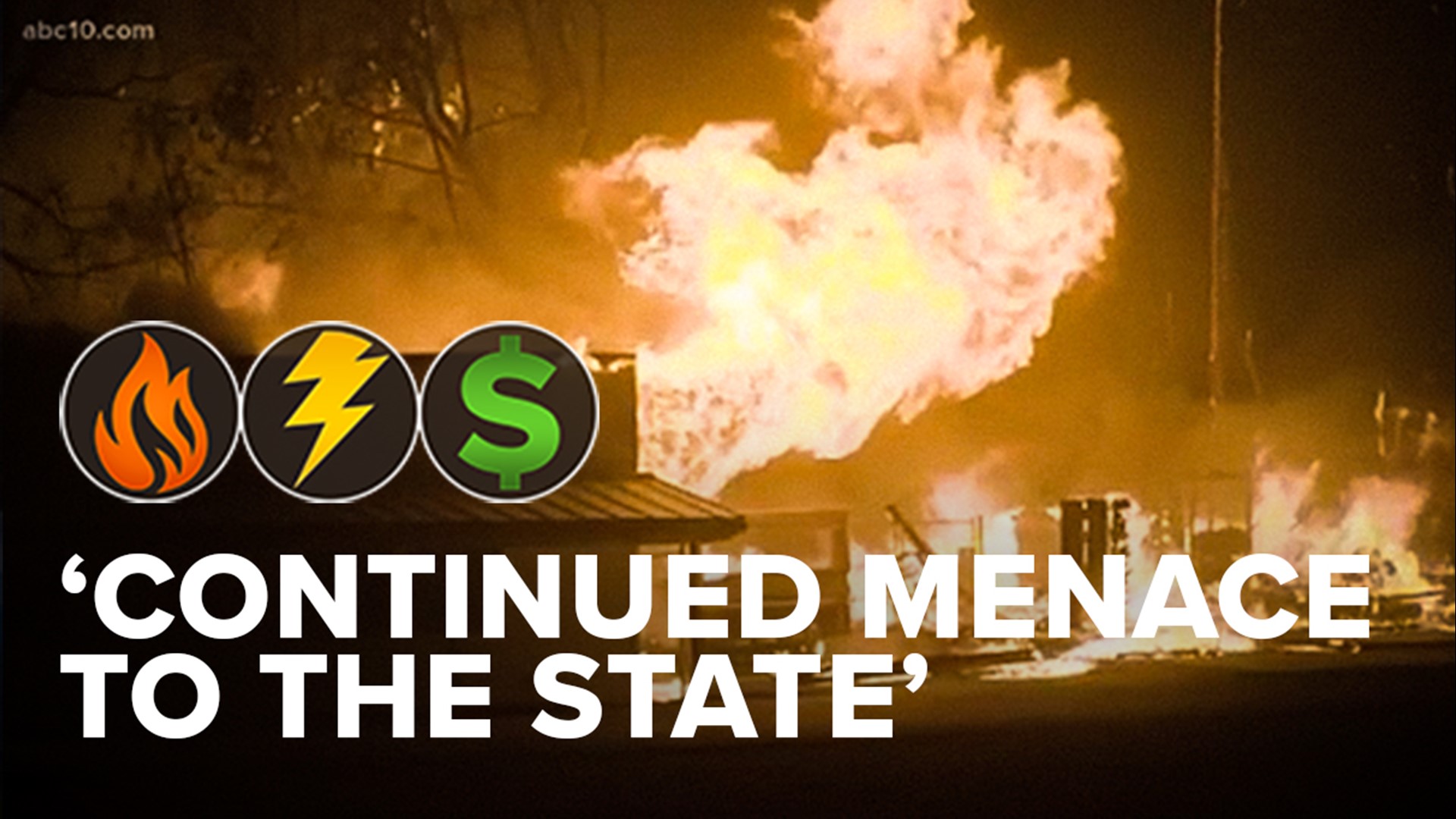CALIFORNIA, USA — With PG&E’s criminal probation set to expire Tuesday night, survivors of the company’s disasters hope that a last-minute change will keep the company under court supervision.
Federal district Judge William Alsup said last week that he would not seek to extend PG&E’s time on probation because prosecutors did not take him up on his offer to consider the move.
The U.S. Attorney’s Office for California’s Northern district declined the judge’s offer, writing that a hearing was not “necessary,” citing uncertainty about the court’s ability to impose more punishment.
“The fact that the federal prosecutor will not take the judge’s lead and keep these people on probation so that they are scrutinized, so they cannot kill another person, is a slap in the face,” said Paradise town councilmember Steve Culleton. “[It] is a slap in the face to everybody that survived the Camp Fire and the 85-plus people that died.”
In January 2017, PG&E was given the five-year maximum probation term for six federal felonies tied to the deadly 2010 San Bruno gas explosion, including obstruction of the investigation.
Since then, PG&E has repeatedly violated its probation, including by breaking rule number one: “While on probation, PG&E shall not commit another federal, state, or local crime.”
The company pleaded guilty to 85 felonies after sparking the 2018 Camp Fire and has been accused of dozens more crimes in fires since.
“If I was on probation and I violated that probation, I would be locked up,” Culleton said.
While that’s true for human defendants, corporate entities cannot go to prison. The U.S. Attorney’s office pointed out there’s no legal precedent for extending probation, though they’d previously suggested that the court could attempt to start PG&E’s five years over again.
Prosecutors told the judge in an April 2019 brief that “the Court may have the authority to revoke PG&E’s probation and impose a new probation term of up to five years, but there appears to be no binding authority on point.”
Disaster survivors slammed U.S. Attorney Stephanie Hinds and her office for deciding not to try to set a precedent, given PG&E’s repeated offenses.
“Shame on them. Shame on them,” Sue Bullis, who gave victim impact testimony in federal court after the San Bruno explosion killed her son, husband, and mother-in-law. “Obviously, they need a new prosecutor.”
“Who’s getting paid off? Somebody’s getting paid off,” Culleton said. “I just think it’s another indication of the corruption that’s associated with bureaucracy.”
Hinds’ office did not respond to repeated requests for an interview.
Judge Alsup’s investigations of probation violations have revealed countless details of PG&E’s involvement in wildfires that otherwise would have stayed secret.
PG&E’s probation officer filed violations last November because PG&E had been charged with dozens of new criminal offenses in the 2019 Kincade and 2020 Zogg Fire.
The charges include felony manslaughter of the four people killed in the Zogg Fire.
“At this juncture, it appears that the state courts are the proper forum” for those issues, the U.S. Attorney’s office wrote earlier this month.
Bullis says that approach will leave Californians less protected for too long.
“It’s going to take years for those [cases] to come to a judgment,” Bullis said. “It did for us.”
With only one whole day remaining in PG&E’s probation, Bullis called on the U.S. Attorney’s office to reverse course. Alternatively, she hopes Judge Alsup will seek a probation extension without them.
Bullis worries people will die because of the decision to let PG&E off.
“I don’t think I’m alone here,” she added.
Bullis isn’t alone.
She’s one of many survivors of PG&E disasters who told ABC10 in December that they wanted probation extended.
ABC10 forwarded the entirety of their comments to the judge, who then invited the prosecutors to ask for an extension.
If the judge were to extend probation, legal experts say PG&E would certainly appeal and would have a strong argument due to the five-year maximum set by federal law.
However, the fact that PG&E was convicted of deadly crimes during probation would make the judge’s decision easier to defend.
“This isn’t just detention at school,” said Santa Clara University law professor Catherine Sandoval, who represents PG&E customers pro bono in the probation.
“You have 115 people who have died due to PG&E’s actions while on probation. If they were a person, not only would they be in jail, but they’d be looking at a death sentence,” Sandoval said.
In his comments last week, the judge signaled a probation extension was a step he wasn’t willing to take without having prosecutors on board to defend the move on appeal.
“In the absence of a motion by the United States Attorney to extend probation, the Court will not do so on its own,” Judge Alsup wrote last week in a filing that said PG&E had “failed” to rehabilitate and “has gone on a crime spree and will emerge from probation as a continuing menace to California.”
Lower court rulings can be defended on appeal by third parties when the government’s lawyers decline to do so, but it only happens in a small minority of cases.
If no further action is taken, PG&E’s probation will end after this Tuesday at the stroke of midnight
GO DEEPER: This story is part of ABC10's FIRE - POWER - MONEY reporting project. If you have a tip that could reveal more about California's crisis with utilities and wildfires, please contact investigative reporter Brandon Rittiman at brittiman@abc10.com.
WATCH MORE:



















